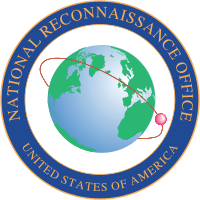Edward C. Aldridge Jr.
| Edward C. Aldridge Jr. | |
|---|---|
 | |
| 9th Director of the National Reconnaissance Office | |
|
In office 3 Aug 1981[1] – 16 Dec 1988[1] | |
| President | Ronald Reagan |
| Preceded by | Robert J. Hermann |
| Succeeded by | Martin C. Faga |
| Personal details | |
| Born |
August 18, 1938 Houston, Texas |
Edward "Pete" Cleveland Aldridge Jr. (born August 18, 1938) has served in many top U.S. Defense Department and defense industry jobs, including as Under Secretary of the Air Force from 1981–1986, Director of the National Reconnaissance Office 1981-1988, and as the Secretary of the Air Force from 1986-1988. From 1989-1992 he was president of the Electronic Systems Company division of McDonnell Douglas, and later, CEO of The Aerospace Corporation. He was the Under Secretary of Defense for Acquisition, Technology and Logistics from 2001-2003.
Aldridge was a payload specialist for STS-62-A, the first scheduled Space Shuttle mission from Vandenberg Air Force Base. The mission was canceled after the Space Shuttle Challenger disaster, and Aldridge never flew.
Career
Aldridge was confirmed as the Pentagon's top weapons buyer on May 8, 2001. As the Under Secretary of Defense for Acquisition, Technology and Logistics, he had responsibility for acquisition, research and development, logistics, advanced technology, international programs, environmental security, nuclear, chemical, and biological programs, and the industrial base.
In 2002, during his time as Under Secretary of Defense for Acquisition, Technology and Logistics, he authorized the acquisition of the F-35's before critical developmental testing was finished and stated the F-35 was "setting new standards for technological advances" and "rewriting the books on acquisition and business practices." His successor voiced a different opinion in 2012. "This will make a headline if I say it, but I'm going to say it anyway," Frank Kendall said. "Putting the F-35 into production years before the first test flight was acquisition malpractice. It should not have been done." As of 2012. The military has spent $373 million to fix planes already bought; the ultimate repair bill for imperfect planes has been estimated at close to $8 billion.[2]
He served in a variety of jobs, including:
- adviser to the Strategic Arms Limitation Talks in Helsinki and Vienna
- senior manager with the LTV Aerospace Corp.,
- senior management associate in the U.S. Office of Management and Budget
- deputy assistant defense secretary for strategic programs
- vice president of national policy and strategic systems group for the System Planning Corporation
- Air Force undersecretary for guiding and supervising the National Reconnaissance Office and the Air Force space program
Affiliations
Affiliations included:
- president and fellow of the American Institute of Aeronautics and Astronautics
- member, Defense Science Board
- national director, Air Force Association
- member of the board of directors of the United States Air Force Academy Foundation
Education
Aldridge received a Bachelor of Science in aeronautical engineering from Texas A&M University in 1960 and a Master of Science from the Georgia Institute of Technology.
Denial of Merchant Mariner's benefits
Secretary Aldridge was a key player in denying veteran's status to U.S. Merchant Marine serving from 1939-1946. Despite granting veteran's status to WASPs (who were disbanded in the middle of the war) Secretary Aldridge referred to the Merchant Marines (who had the highest casualty rates of the war) as a "subculture" and "draft dodgers." Aldridge altered statutes to set the end of World War II as August 15, 1945 instead of December 31, 1946. This resulted in the 1987 case "Schumacher, Willner, et al., v. Aldridge [Secretary of the Air Force Edward C. Aldridge, Jr.] 665 F. Supp. 41 (D.D.C. 1987)." Although Secretary Aldridge and his U.S. Air Force panel (who were assigned as "Merchant Marine experts" on the veterans claims board) lost, he still refused to grant veteran's status.[3]
Awards
Awards include the Department of Defense Distinguished Civilian Service Award, Secretary of Defense Meritorious Civilian Service Award, and the Department of Defense Distinguished Public Service Award.
In 2005, the Space Foundation awarded Aldridge its highest honor, the General James E. Hill Lifetime Space Achievement Award,[4] presented annually to recognize individuals who have distinguished themselves through lifetime contributions to the welfare or betterment of humankind through the exploration, development and use of space, or the use of space technology, information, themes or resources in academic, cultural, industrial or other pursuits of broad benefit to humanity.
References
- 1 2 Laurie, Clayton. Leaders of the National Reconnaissance Office 1961-2001. Office of the Historian, National Reconnaissance Office. 1 May 2002.
- ↑ http://www.time.com/time/magazine/article/0,9171,2136312,00.html
- ↑ http://www.usmm.org/strugglevetstatus.html
- ↑ "Archived copy". Archived from the original on February 3, 2009. Retrieved January 31, 2012.
External links
| Government offices | ||
|---|---|---|
| Preceded by Antonia Handler Chayes |
Under Secretary of the Air Force 3 August 1981 - June 9, 1986 |
Succeeded by James F. McGovern |
| Preceded by Robert J. Hermann |
Director of the National Reconnaissance Office 3 August 1981 - December 16, 1988 |
Succeeded by Martin C. Faga |
| Preceded by Russell A. Rourke |
Secretary of the Air Force (acting) April 8, 1986 - June 8, 1986 June 9, 1986 - December 16, 1988 |
Succeeded by James F. McGovern (acting) |
| Preceded by Jacques S. Gansler |
Under Secretary of Defense for Acquisition, Technology and Logistics 10 May 2001 - 23 May 2003 |
Succeeded by Michael W. Wynne (acting) |

